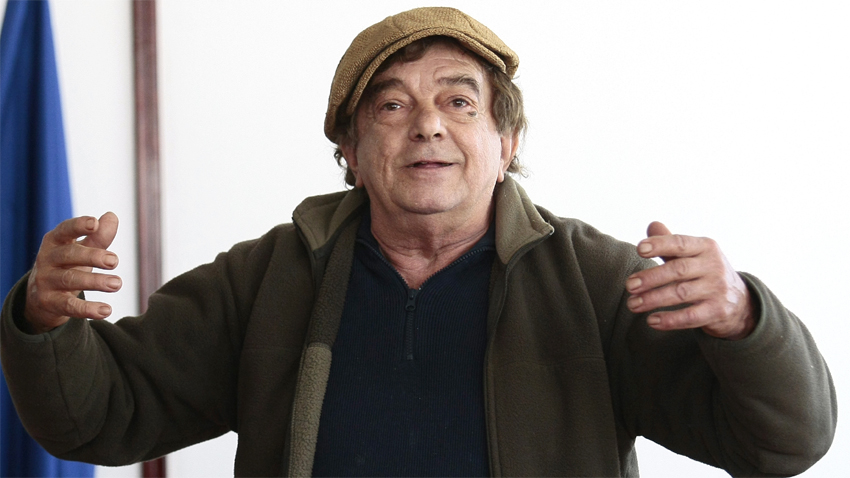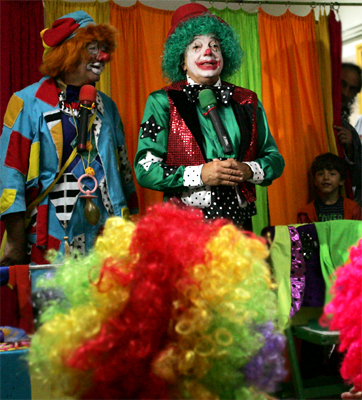Beloved by several generations of Bulgarians actor Nikolay Nikolaev, has often been seen in the role of the clown Dr. Koko, who helps the treatment of seriously ill children in the Pirogov Hospital with his laughter and tricks. Nikolay is a graduate of the National Academy of Film and Theatre Arts, together with renowned actors Todor Kolev, Vancha Doycheva, Ivan Nalbantov. He had been playing in the Ivan Vazov National Theatre until the democratic changes in our country. Then he went to Italy, where for a few years he was working in the biggest circus as a clown. "When I was 60 years old and after 28 years on the theatre stage, I decided to study the art of clown," the actor says.
 "I am a happy man. Eight years ago I underwent a complex surgery because of cancer. After leaving the hospital, I decided to devote the rest of my life to ill children of Bulgaria. That is why I created the only existing in Bulgaria Laughter and Psychotherapy Clinic. We take care of patients in the Pirogov hospital where there are children from all over the country.The results are amazing. Children usually leave the hospital 5 or six days earlier. My priority is a system of healing that I created and even patented. It has nothing to do with jokes that are used as a method in other hospitals. In every hospital in Western Europe they have medical clowns. Who enter the room, making a joke and then leave. They usually wear a white coat and a red nose and have syringes with them, so children are usually terrified. My system is different. With my partner we say we are clown doctors and the children start laughing. Then we show them some magic tricks and we
"I am a happy man. Eight years ago I underwent a complex surgery because of cancer. After leaving the hospital, I decided to devote the rest of my life to ill children of Bulgaria. That is why I created the only existing in Bulgaria Laughter and Psychotherapy Clinic. We take care of patients in the Pirogov hospital where there are children from all over the country.The results are amazing. Children usually leave the hospital 5 or six days earlier. My priority is a system of healing that I created and even patented. It has nothing to do with jokes that are used as a method in other hospitals. In every hospital in Western Europe they have medical clowns. Who enter the room, making a joke and then leave. They usually wear a white coat and a red nose and have syringes with them, so children are usually terrified. My system is different. With my partner we say we are clown doctors and the children start laughing. Then we show them some magic tricks and we  also use water therapy, teaching them to drink clean water. In the hospital and everywhere else they sell various sodas that contain artificial colorants and flavours. But it is difficult to ban them. That is why I give children a glass of clean water and tell them that this is their biggest price as we are all made of water."
also use water therapy, teaching them to drink clean water. In the hospital and everywhere else they sell various sodas that contain artificial colorants and flavours. But it is difficult to ban them. That is why I give children a glass of clean water and tell them that this is their biggest price as we are all made of water."
The actor has gone even further in his experiments with water. Some time ago with famous Bulgarian physics Professor Zhivko Zhelev he developed special equipment to measure the structure of water. An experiment was demonstrated both in hospitals in Strasbourg and Sofia. It showed that children’s laughter charged water with healing qualities.
"We gave children glasses filled with water. They held them with both hands. We measured the structure of water at first, and then entertained children with anecdotes, songs, and riddles and finally made another measurement. We proved scientifically that water stores laughter, music and mood of the people. The power of laughter can make a person feel full of energy and make them healthier. But it can also have a negative charge just like the laughter of a popular showman who uses sarcasm and mocks politicians and other people. I do not like such a type of laughter as it is malicious, harmful. I have noticed over the past 27 years since the start of democratic changes that that we are constantly at the first place in poverty, corruption, disease in Europe. I am very sad about the fact that we also top the negative chart for child murders and suicides. Ever since I realized that I set a task to take care of the mental health of as many children as possible. Our children are suffering from a glut of computer games, false morality and ugly TV shows,” laughter therapist Nikolay Nikolaev says and adds:
"There is a great difference in the laughter and attitudes of Bulgarians. The change took place 60 years ago. Older people in my village told me that when a stranger came around they offered them a place to sleep for the night. Now everything is upside down. Now a lot of people laugh if someone falls on the ice or something bad happens to them. This is a harsh contrast between the morality of the people now and in the past.”
English: Alexander Markov
8 December is the day on which Bulgarian university students traditionally celebrate their holidays. The holiday is very popular in Bulgaria and often brings together not only current but also former students. The day was first celebrated in 1903..
Spicy means culture and Alexander Kyurkchiev - Sando, founder of a chilli pepper farm near Sofia and the first chilli pepper museum in this country, is sure of this. For the second year in a row he is organizing the Sofia Chilli Fest..
For more than a week now, the story of a family of breeders raising local breeds of sheep has captured the attention of not only the Bulgarian public, but also of compatriots abroad. Instead of following the drama in Parliament and the struggle for..
The making of knitted products is a traditional craft that deserves a revival and a new life, believes Alexandrina Pandurska, known for her numerous..

+359 2 9336 661
